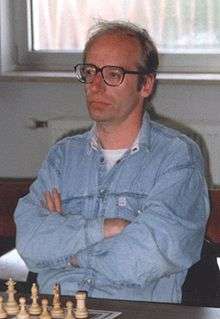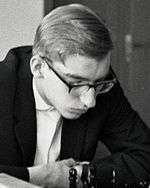Robert Hübner
| Robert Hübner | |
|---|---|
 | |
| Full name | Robert Hübner |
| Country | Germany |
| Born |
November 6, 1948 Cologne, West Germany[1] |
| Title |
International Master (1969) Grandmaster (1971) |
| FIDE rating | inactive (not rated) |
| Peak rating | 2640 (July 1981) |
Robert Hübner (born November 6, 1948) is a German chess Grandmaster, chess writer, and papyrologist. He was one of the world's leading players in the 1970s and early 1980s.
Chess career
At eighteen, he was joint winner of the West German Chess Championship.
His International Master (IM) title was awarded in 1969 and his Grandmaster (GM) title in 1971.[1] He reached third place in the FIDE world ranking list in 1980.
Hubner played in three Candidates Tournaments for the World Championship. Each ended in controversial circumstances:
- In 1971, he forfeited a closely contested quarter final to Tigran Petrosian, complaining about the noise, when he was down 1 point.
- In 1980-81, his best result, he reached the final before losing to Viktor Korchnoi. He forfeited the match after 10 games, again when he was down 1 point.
- In 1983, he lost a quarter final to Vassily Smyslov in unique circumstances: with the match tied after the original 10 games plus 4 further games, the tie was resolved (in Smyslov's favour) by a spin of a roulette wheel.[2]
At his strongest in the mid-seventies to early eighties, Hübner participated in many of the elite tournaments of the day, such as Tilburg 1978 and Montreal 1979 (The Tournament of Stars), playing alongside Anatoly Karpov, Mikhail Tal, and Jan Timman. There were tournament victories at Houston 1974, Munich 1979 (shared with Ulf Andersson and Boris Spassky), Rio de Janeiro Interzonal 1979 (shared with Lajos Portisch and Tigran Petrosian),[3] and Linares 1985 (shared with Ljubomir Ljubojević).
He served as a second to Nigel Short in the 1993 world championship match against Garry Kasparov.
In 2000 he won, with the German team, a silver medal in the 34th Chess Olympiad in Istanbul.
He remained active on the international circuit into the 2000s, but has never been a full-time chess professional due to his academic career.
Playing style

Over the chessboard, Hübner's technique has been described as efficient and ruthless. According to Bill Hartston—"His perfectionist and rather pessimistic approach, however, prevented him from reaching the very top."[4]
Other contributions
Hübner's contributions to chess literature include the study of World Champions and extensive analysis of 19th-century chess brilliancies. His recent contributions are detailed analysis and study of the chess games of World Champions – notably Bobby Fischer and Alexander Alekhine.
He is the eponym of the Hübner Variation of the Nimzo-Indian Defence: 1.d4 Nf6 2.c4 e6 3.Nc3 Bb4 4.e3 c5 5.Bd3 Nc6 6.Nf3 Bxc3+.[5]
Additionally, Hübner is known as one of the world's best xiangqi players not from China.[6]
Notable games
- Robert James Fischer vs Robert Hübner, Palma de Mallorca iz 1970, Caro-Kann Defense: Breyer Variation (B10), ½–½ A dramatic game with central pawn attacks against the GM Robert James Fischer.
- Robert Hübner vs Raymond Keene, Vienna (Austria) 1972, Modern Defense: King Pawn Fianchetto (B06), 1–0 After a long series of manoeuvres the White pressure on the Black king position peaks in a winning combination.
Notes
- 1 2 Gaige, Jeremy (1987). Chess Personalia, A Biobibliography. McFarland. p. 181. ISBN 0-7864-2353-6.
- ↑ CHESS; SHOULD CHANCE DECIDE THE OUTCOME OF A MATCH?, Robert Byrne, New York Times, May 9, 1983
- ↑ Hooper, David and Whyld, Kenneth (1984). The Oxford Companion To Chess. Oxford University. pp. 147, 148. ISBN 0-19-217540-8.
- ↑ Hartston, William (1996). The Guinness Book of Chess Grandmasters. Guinness Publishing Ltd. p. 200. ISBN 0-85112-554-9.
- ↑ Hansen, Carsten (2002). The Nimzo-Indian: 4 e3. Gambit Publications Ltd. ISBN 1-901983-58-7.
- ↑ Chinese Chess for Beginners by Sam Sloan (1989) ISBN 0-923891-11-0
References
- Golombek, Harry (1977). Golombek's Encyclopedia of Chess. Crown Publishing. ISBN 0-517-53146-1.
External links
| Wikimedia Commons has media related to Robert Hübner. |
- Dr. Robert Huebner rating card at FIDE

- Robert Huebner player profile and games at Chessgames.com